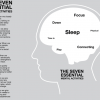PLACES TO START
VV(SUGGESTIONS)VV
Neuronutrients
Dr. Galland offered several supplements with Anti-inflammatory effects that should be considered for patients with neuro inflammatory conditions. A great place to start would be omega-3s. “In clinical trails we’ve seen that EPA is most effective for mood, however DHA has a superior benefit for helping with circulation and perhaps for supporting neuro function itself. Personally, I like to use mixtures of both in supplementation,” he said.
Another supplement garnering great interest is curcumin, according to Dr. Galland, but that absorption is an important consideration. “Curcumin tends to get bound and inactivated rapidly in gastroin- testinal tract, so there’s a lot of work being done to enhance its bioavailability to tis- sues,” he said. “Curcumin does amazing things in test tube, yet its clinical perform- ance has been challenging, but promising— it shows promise as a neuroprotective inflammatory substance at a dosage that’s hard to achieve from food alone (2-4 g per day), so supplementation is a viable option.”
Finally, Dr. Galland noted that vitamins C And E may also be helpful.
Carotech’s See agreed with Dr. Galland’s suggestions, adding that products containing natural full spectrum tocotrienol complex, such as his company’s Tocomin SupraBio (a natural vitamin E derived from non-GMO palm oil); omega-3 fatty acids (DHA) and curcumin have been recommended for brain health/neuroinflammation.
“One of the natural approaches to treatment is through supplementation, e.g. DHA and vitamin E (tocopherols and tocotrienols—lipid antioxidant). In general, these products address neuroinflammation through anti-inflammatory properties and by modulating the signaling pathway,” said See.
He pointed to recent studies completed at the Karolinska Institute in Sweden and Perugia University of Italy showing that high plasma levels of full spectrum vitamin E (alpha, beta, gamma and delta-tocotrienol; alpha, beta, gamma and delta-tocopherol) are associated with a reduced risk of AD in very old people6; and low plasma levels of full spectrum vitamin E is directly linked to increased risk of developing mild cognitive impairment (MCI) and AD.7
Dr. Skowron said it has been his experience that natural treatments for brain chem- istry modification as well as the immune system are helpful for patients.
“We always suggest natural products with our patients, as we find these more curative, more beneficial, and with fewer side effects,” he explained. “We always perform genetic testing (MTHFR, COMT, MAO) to help patients balance their brain chemistry to improve symptoms.” Dr. Skowron and his associates will often prescribe methylfolate, activated B vitamins, GABA, 5-HTP, probi otics, fish oil and vitamin D, and offered a compelling study showing vitamin D modulating Parkinson’s and multiple sclerosis.8
NeuroOne includes:
• Sharp PS phosphatidylserine, which sup- ports acetylcholine levels and neurotrans- mission of serotonin, norepinephrine, and dopamine; improves the way the brain uses glucose; promotes brain cellular energy and catalyzes neurotransmitter production;
• Sharp GPC glycerophosphatidylcholine, which rapidly boosts acetylcholine levels in the brain (acetylcholine is an essential neu- rotransmitter that effects alertness, memory and learning);
• BaCognize Bacopa monnieri, which regulates serotonin receptors, key for mem- ory, mood and focus;
• Ginkgo biloba and vinpocetine, which are antioxidant botanicals that act as vasodilators and improve cerebral blood flow and cerebral oxygenation;
• Omega-3 fish oil, which raises levels of brain-derived naturo- pathic growth factor- protects neurons, improves neurotrans- mission and supports brain structure; and
• Botanical Neuro Complex, comprised of resveratrol, quercetin, ginger, grapeseed extract, rosemary extract and Perluxan hops; it controls brain inflammation and neutral- izes brain oxidative stress.
“The highly pure, concentrated form of phosphatidylserine (Sharp PS) supplied in our formula enables us to include a high potency of this important neuronutrient with room to include 10 additional ingredients within a small serving size. This sets us apart when compared to other cognitive support formulas in the marketplace,” said McIntee, who noted that the U.S. Food and Drug Administration (FDA) has supplied an approved health claim for PS.
Vital Nutrients’ comprehensive brain health product, Vital Brain Powder, also utilizes PS and GPC, in addition to acetyl L-carnitine, which crosses the blood-brain barrier and may aid production of the neu- rotransmitter acetylcholine and improve mild memory impairment, according to Dr. Baldwin-Lien. “Preliminary studies have shown GPC to benefit cognitive func- tion in Alzheimer’s patients, and both cognitive function and behavior in vascular dementia and stroke victims, particularly when started within 10 days post-stroke,” she said. “And PS has demonstrated benefits for memory, learning, concentration, word choice, mood and stress tolerance.”
In addition, the company offers a number of products that can help support brain health, circulation, normal inflammation and neurotrans- mitter levels, and memory, including its UltraPure Fish Oil products, Ginkgo Extract 24%/6% 80 mg and its Melatonin 5, 10 and 20 mg.
---------------------------------------------------------------------------------------------------------------------------------------------------------------------------------------------------
MEDICAL EVIDENCE OF VINPOCETINE AGAINST NEUROINFLAMMATION
Vinpocetine Reduces brain Inflammation | Prairie Naturals
Anti-inflammatory effects of Vinpocetine on the functional expression of nuclear factor-kappa B and tumor necrosis factor-alpha in a rat model of cerebral ischemia-reperfusion injury.
Wang H1, Zhang K2, Zhao L3, Tang J3, Gao L3, Wei Z3.
Author information
Abstract
OBJECTIVE:
The restoration of blood flow to the brain after ischemic stroke prevents further, extensive damage but can result in reperfusion injury. The inflammation response is one of many factors involved in cerebral ischemia-reperfusion injury. This study investigated the use of vinpocetine, a drug used to treat cognitive impairment, to explore its effects on inflammation in a rat model of cerebral ischemia-reperfusion.
METHODS:
Wistar rats were randomly assigned to a control group, (n=40) a cerebral ischemia-reperfusion group (n=52) and a vinpocetine cerebral ischemia-reperfusion group (n=52). A model of middle cerebral artery occlusion was induced for 2h followed by reperfusion and the infarct size was determined by 2,3,5-triphenyltetrazolium chloride (TTC) staining 6h, 24h, 3 days, and 7 days after reperfusion. The dry-wet weight method was used to measure brain water content and evaluate the extent of brain edema. Immunohistochemistry and in-situ hybridization were used to detect the expression of NF-κB and TNF-α.
RESULTS:
The NF-κB levels in ischemic brain tissue increased 6h after reperfusion and the TNF-α levels increased at 24h, both reached their peaks at day 3 then decreased gradually, but remained above the controls at day Vinpocetine decreased the levels of NF-κB and TNF-α 24h and 3 days after reperfusion.
CONCLUSION:
NF-κB and TNF-α is associated with changes in brain edema and infarct volume. Vinpocetine decreases the expression of NF-κB and TNF-α and inhibits the inflammatory response after cerebral ischemia-reperfusion.
Edited by Mr. Psychillogical, 16 January 2017 - 11:10 PM.
















































